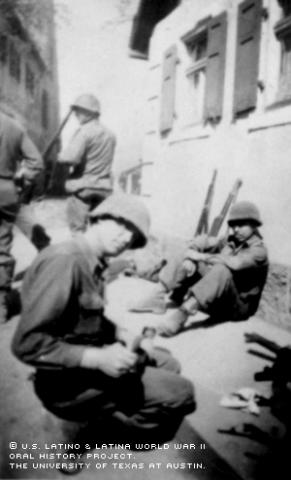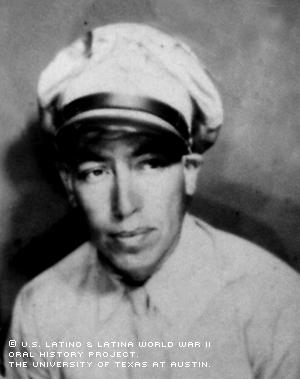

By Angela Macias
Augustinee Martinez knew little about being a solider when his 65th Infantry Division reached La Havre, France.
Though Martinez trained at Camp Shelby in Mississippi, and then in France for more than a month before hitting the front lines in March of 1945, he wasn't prepared for the intense battle his division entered.
"Two, three days [in combat], you learn everything," Martinez said.
He found himself holding the Saarlautern Bridge in Germany. The rifleman got his first glimpse at the German forces as they threw flares into the air to find U.S. soldiers.
"When you throw those flares, you got to freeze ... like a stump. Until that thing dies down, then run," Martinez said. "Just run, run, run, run."
As they progressed into Cologne, Germany, Martinez saw an intense fire that engulfed the city. There, the soldiers searched houses and watched as people looted department store buildings. Martinez says the intense fighting, coupled with orders to keep pushing forward, gave the soldiers little time to think about what was going on around them. As he passed the Rhine River, he saw a horrific amount of casualties on the shore.
"We were just scared," Martinez said.
When they reached a hill past the river, Martinez asked a man next to him if the area was infested with mosquitoes. To his surprise, the sound he heard was bullets whizzing past his head.
"Up the hill, they were just shooting at us," Martinez recalled.
It was also at the river that he recalls the most severe fighting, but his division pushed toward Berlin.
"You hustle, you're hungry," Martinez said. "They only gave us 15 minutes to rest. I [was] tired all the time."
New soldiers were constantly replacing men because injury and death had taken a toll.
"I had a lot of buddies," Martinez said. "You turn around and they are gone."
Then one day, the troops stopped and were told German forces had surrendered.
"I never seen Berlin," he said.
He had to return to France for a couple of months before going home, using his time by going into the city. Martinez took three trips to Paris.
"It was nice. I like Paris," he said. "I went all the way around looking all over. It was beautiful."
The end of the war was a blessing to the homesick Martinez, but the time between his leaving battle and getting back home seemed like forever. He sat at a camp just outside of Paris before loading on a boat back to the U.S.
"I went crazy, you want to get home," he said. "I think that was worse than battle, just waiting and waiting."
He missed his wife, Elizabeth Diaz Martinez, and his two sons, Rudy and Danny, back home in St. Paul, Minn.
"You just think of your family; you sit down and think of your wife, your kids and things like that," Martinez said. "When you leave your wife behind, kids and all, that's the worse thing there is."
Most of Martinez's young life was spent traveling through the U.S. When the war started, he had little interest in leaving the city that was his first permanent home.
When Martinez was drafted, his job postponed his tour for two years. Even after getting into the service, he tried his hardest to return to his family, he says.
"I see a lot of guys getting discharged and I said, 'I wish I were you,'" he recalled. "There was nothing wrong with me," however, he said
Martinez was accustomed to hard work like the kind he endured in the service. Born in Mexico, he came to the U.S. when he was 2 months old with his parents, grandparents, aunts and uncles. His parents, Jessie Martinez and Amelia Vasquez Martinez, first labored as migrant workers. Martinez and his five sisters and three brothers also helped out, picking cotton in Texas. Jessie eventually found stable work with a railroad, living in Fort Worth for a time in the 1920s.
Then the family found a flier, promising "big money" for jobs in the north working sugar beet fields. They traveled to North Dakota, settling in St. Paul for the winters. They’d collect junk like rags and cooper to earn money during the colder months.
Martinez only completed the sixth grade, because he began school late each year after working the fields in North Dakota.
Once he was old enough to work, he got his first job at a poultry company, cleaning and plucking chickens. He bounced from numerous jobs, working at several hotels, a packing house, operating streetcars, and as a city employee, before settling with American Hoist and Derrick.
"In those days you could get a job any place," he said.
Martinez finally made it home near the end of 1945, returning to his job as a steel operator. But his stay in America would only be brief, as he found out he had three weeks vacation coming and decided to take his family on a trip to Mexico. They loaded into their station wagon to take the sojourn, which took three days each way. It would be the last time Martinez would venture out of the U.S.
"We had a lot of fun, riding horses," he said. "We had a good time, a good trip."
He returned to work, where he stayed for 35 years before retiring.
"I went to school here, I work here," he said. "I got my bread and butter here. Minnesota's the best."
Martinez had two more children, both daughters; one died as child, the other is named Rita. He married twice more; in all three marriages he was made a widower.
Mr. Martinez was interviewed in St. Paul, Minnesota, on August 12, 2002, by Angela Macias.

